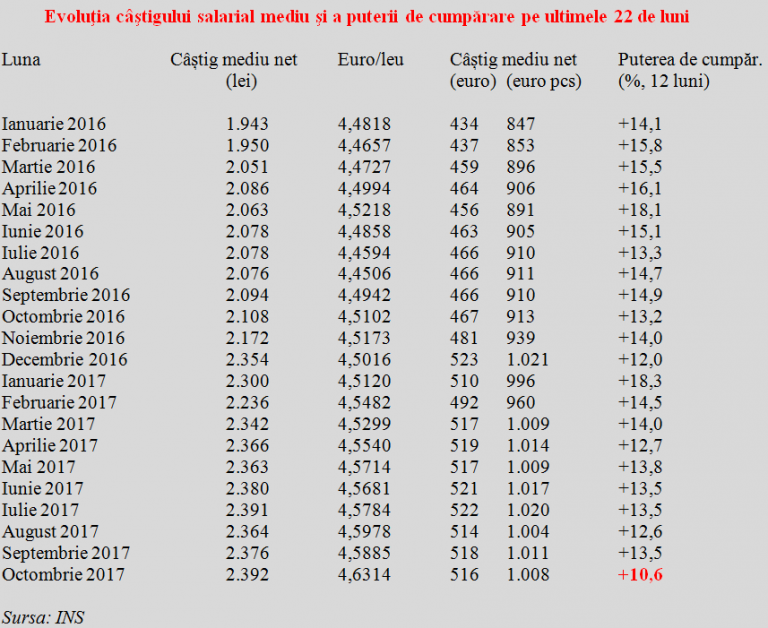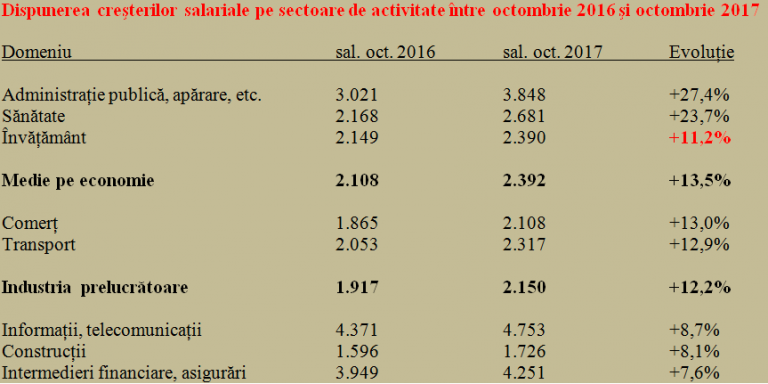 The gross average national wage announced by the National Institute of Statistics for October 2017 was 3,327 lei, 0.7% higher than the previous month and the corresponding net amount went up to 2,392 lei, with extra 16 lei. However, the real wage (the purchasing power of collected money) decreased by 0.6% compared to September 2017 and the index against the reference month of October 1990 decreased by one percentage point (from 178.3% to 177.3%) because of the significant increase in prices.
The gross average national wage announced by the National Institute of Statistics for October 2017 was 3,327 lei, 0.7% higher than the previous month and the corresponding net amount went up to 2,392 lei, with extra 16 lei. However, the real wage (the purchasing power of collected money) decreased by 0.6% compared to September 2017 and the index against the reference month of October 1990 decreased by one percentage point (from 178.3% to 177.3%) because of the significant increase in prices.
Net average national wage has fallen from 518 euro to 516 euro, at the average exchange rate of November 2017 (the month of effectively receiving the money) or 1,008 euro in terms of purchasing power at the EU average prices. This is the direct consequence of the biggest increase of the exchange rate this year, at an average level of 4.6314 lei/euro compared to 4.5885 lei/euro in the previous month.
The growth rate over the same month of the previous year was 13.5% in nominal terms (a significant coincidence, exactly the same level as the REAL growth in the previous month), but declined to just 10.6% in terms of EFFECTIVE PURCHASE POWER. This is the lowest value recorded in the past 22 months, although the national average net salary has increased from less than 2,000 lei to 2,400 lei.
The value is still higher than the economic growth announced for the first three quarters of 2017, but the economic foundations start to have their say and the economic theory implacably transpose into the reality. Basically, it is a signal that unless we try to voluntarily correct ourselves, in a controlled manner, the market economy will correct us.
*
- Evolution of the national net average salary and purchasing power in the last 22 months
- Month National average net salary Euro/RON National average net salary Purchasing power
*
How increases got arranged in the national economy
The highest percentage increases of incomes in the national economy have been recorded in some public sectors, with the mention that public administration (inevitably, there goes the lion’s share, whatever they say), has outgrown the health sector and left education far behind and even below the average of the growth rate recorded at the level of the national economy.
It can also be noticed how auxiliary activities such as trade and transport have benefited to a greater extent from the economic growth, even compared to the manufacturing sector, left behind at a level less than 90% of the average earnings in the economy. We remind and point out, this is a totally atypical situation in the EU member states (the ratio is reversed in most of them) and in a continuous deterioration.
*
- Structure of wage increases by sector of activity between October 2016 and October 2017
- Field of activity salary in October 2016 salary in October 2017 Change
- Public administration, defence, etc
- Health
- Education
- Average level in the economy
- Trade
- Transport
- Manufacturing sector
- IT&C
- Construction
- Financial intermediation and insurance
*
It should also be noted that sectors such as the information and telecommunications (which had a remarkable contribution to this year’s economic growth rate), the construction or financial intermediation and insurance have seen wage increases much closer to the GDP growth. This confirms the effect of artificially generating wage increases, eroded by inflation and exchange rate, induced by the measures taken at the Government level.











